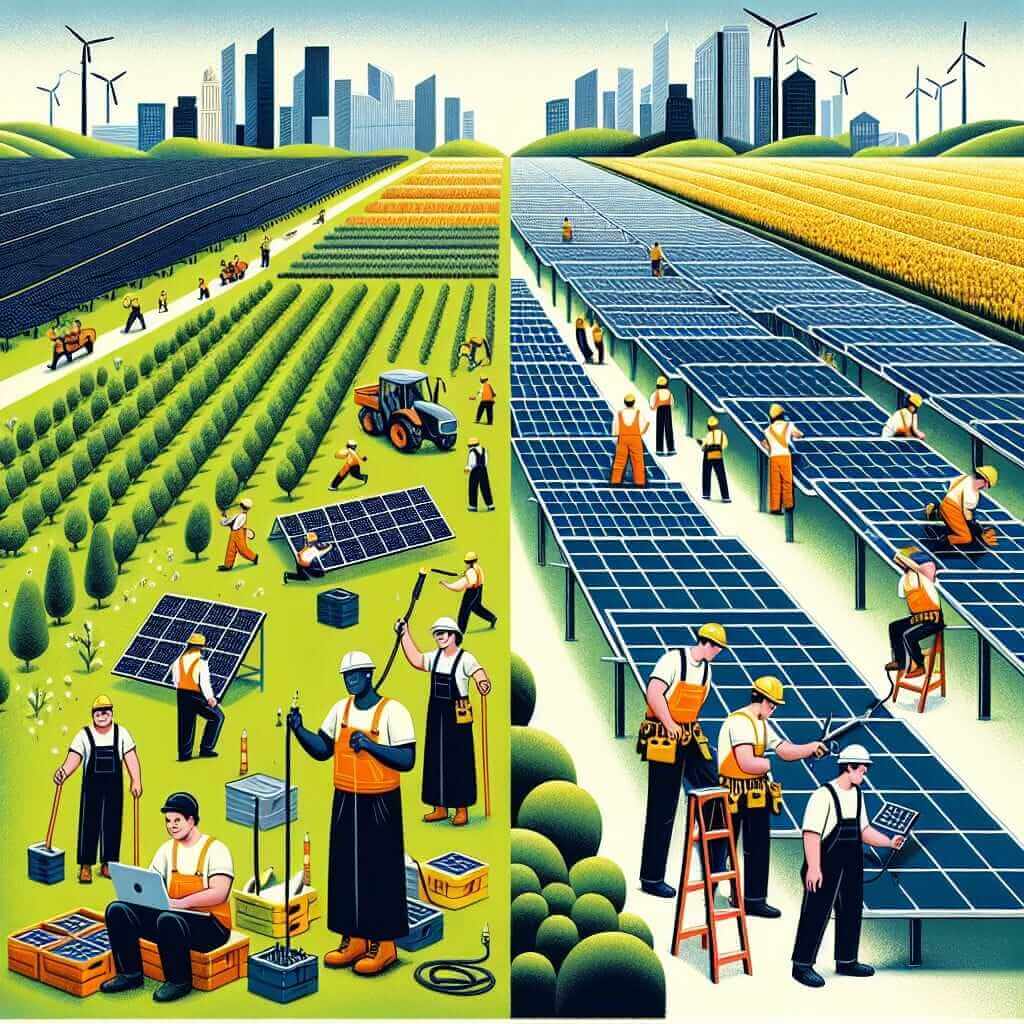The IELTS Reading test can be a challenging part of the exam, requiring you to effectively comprehend and analyze academic texts. One common topic that has gained traction in IELTS exams is renewable energy and its economic impacts. Specifically, the query “How does renewable energy adoption impact job creation in the energy sector?” is a pertinent and highly relevant topic in today’s world.
In past IELTS exams, topics related to renewable energy have often appeared due to their global significance. Given the increasing efforts to combat climate change and develop sustainable energy sources, it’s plausible that such a topic will recur in future exams. This article will provide a comprehensive reading passage, followed by a set of questions and detailed answers, mimicking the format and difficulty of the actual IELTS test. Additionally, the article will discuss common pitfalls, important vocabulary, and relevant grammar structures to help you better prepare for the Reading section.
Main Content
Reading Passage: Medium Text
Renewable Energy and Job Creation in the Energy Sector
The transition to renewable energy sources, such as wind, solar, and biomass, is not just a key strategy for combating climate change but also a significant driver of job creation in the energy sector. This crucial shift has been bolstered by governmental policies and technological advancements that have made renewable energy more economically viable.
Job Opportunities and Economic Impact
Adopting renewable energy technologies has led to the creation of a diverse range of job opportunities. For instance, the installation and maintenance of solar panels require a skilled workforce, thereby generating jobs in engineering, installation, and maintenance services. Similarly, the wind energy sector demands expertise in turbine manufacturing, transportation, and on-site assembly.
Moreover, the decentralization of energy production through small-scale renewable energy projects has the potential to stimulate local economies, particularly in rural areas. These projects often require local labor for installation and maintenance, contributing to community development and reducing urban migration.
Challenges and Future Prospects
Despite the positive impact on employment, the shift to renewable energy presents several challenges. One notable issue is the mismatch between the skills of workers in traditional fossil fuel industries and those needed for renewable energy jobs. To address this, significant investment in training and education programs is essential.
Looking forward, the continuous innovation and scaling up of renewable energy projects are likely to further expand the job market. As countries commit to ambitious climate targets, the demand for renewable energy is expected to grow, driving job creation in both direct and indirect roles within the energy sector.
Reading Questions
Multiple Choice
-
What is one key factor that has made renewable energy more economically viable?
- A) Public awareness campaigns
- B) Technological advancements
- C) High cost of fossil fuels
- D) Scarcity of traditional energy resources
-
Which sector benefits from job creation due to the installation and maintenance of solar panels?
- A) Transportation
- B) Agriculture
- C) Engineering
- D) Retail
True/False/Not Given
- Decentralized energy production predominantly benefits urban areas.
- The transition to renewable energy will eliminate job opportunities in traditional fossil fuel industries.
Matching Information
Match each statement with the appropriate paragraph (A, B, or C).
- The paragraph that discusses the prospects of job market growth in renewable energy.
- The paragraph that covers the local economic impact of renewable energy projects.
Answer Keys and Explanations
-
B) Technological advancements
- Explanation: Technological advancements have made renewable energy more economically viable by reducing costs and improving efficiency.
-
C) Engineering
- Explanation: The installation and maintenance of solar panels primarily create jobs in engineering, which involves a skilled workforce.
-
False
- Explanation: The passage states that decentralized energy production benefits rural areas, not urban ones.
-
Not Given
- Explanation: The passage does not provide information about the elimination of job opportunities in traditional fossil fuel industries.
-
C
- Explanation: Paragraph C discusses the future prospects and continuous innovation likely to expand the job market in renewable energy.
-
B
- Explanation: Paragraph B mentions the local economic impact and job creation from small-scale renewable energy projects in rural areas.
Common Mistakes and Tips
- Misinterpretation of Details: Make sure to read the questions carefully and refer back to specific parts of the text to avoid misunderstanding.
- Overlooking Key Vocabulary: Pay attention to keywords and phrases related to the topic. They often hold the answer to the comprehension questions.
Vocabulary
- Decentralization (n.): /ˌdiː.sen.trə.lɪˈzeɪ.ʃən/ – The distribution of functions and powers from a central authority to regional and local authorities.
- Bolster (v.): /ˈbɒl.stər/ – To support or strengthen.
- Viable (adj.): /ˈvaɪ.ə.bəl/ – Capable of working successfully; feasible.
Grammar Focus
-
Present Perfect Tense:
- Used to describe actions that have occurred at an unspecified time before now and may have relevance to the present moment.
- Example: The transition to renewable energy has led to the creation of a diverse range of job opportunities.
-
Passive Voice:
- Often used to emphasize the action rather than the subject performing the action.
- Example: Renewable energy projects are often decentralized to stimulate local economies.
Conclusion
Successfully tackling the IELTS Reading section requires understanding various types of questions and practicing with authentic passages. Topics like renewable energy and job creation have recurring relevance and can provide insightful practice material. By focusing on vocabulary, grammatical structures, and common pitfalls, you can enhance your reading comprehension skills and perform better in the actual exam.
For more comprehensive reading materials and practice tests, visit our related articles: How Does Renewable Energy Adoption Affect Job Markets? and How Is Renewable Energy Influencing Global Economic Policies?.

When preparing for the IELTS Reading test, consider integrating these insights and practice passages into your study routine for a higher chance of success.